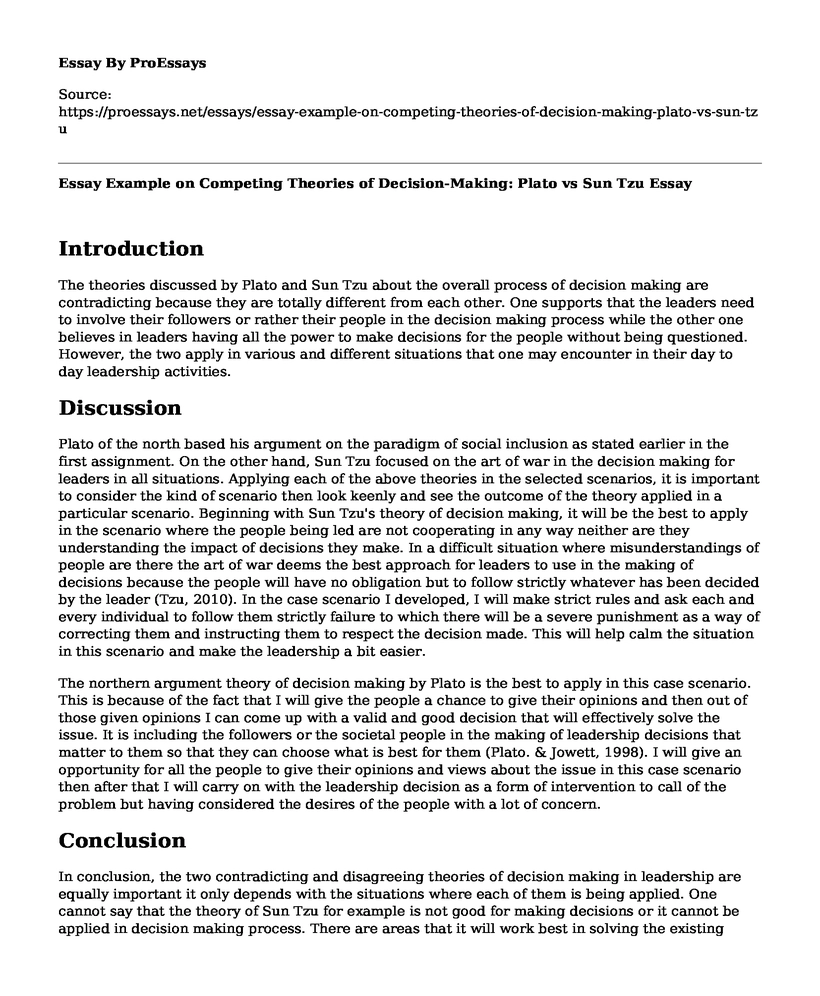Introduction
The theories discussed by Plato and Sun Tzu about the overall process of decision making are contradicting because they are totally different from each other. One supports that the leaders need to involve their followers or rather their people in the decision making process while the other one believes in leaders having all the power to make decisions for the people without being questioned. However, the two apply in various and different situations that one may encounter in their day to day leadership activities.
Discussion
Plato of the north based his argument on the paradigm of social inclusion as stated earlier in the first assignment. On the other hand, Sun Tzu focused on the art of war in the decision making for leaders in all situations. Applying each of the above theories in the selected scenarios, it is important to consider the kind of scenario then look keenly and see the outcome of the theory applied in a particular scenario. Beginning with Sun Tzu's theory of decision making, it will be the best to apply in the scenario where the people being led are not cooperating in any way neither are they understanding the impact of decisions they make. In a difficult situation where misunderstandings of people are there the art of war deems the best approach for leaders to use in the making of decisions because the people will have no obligation but to follow strictly whatever has been decided by the leader (Tzu, 2010). In the case scenario I developed, I will make strict rules and ask each and every individual to follow them strictly failure to which there will be a severe punishment as a way of correcting them and instructing them to respect the decision made. This will help calm the situation in this scenario and make the leadership a bit easier.
The northern argument theory of decision making by Plato is the best to apply in this case scenario. This is because of the fact that I will give the people a chance to give their opinions and then out of those given opinions I can come up with a valid and good decision that will effectively solve the issue. It is including the followers or the societal people in the making of leadership decisions that matter to them so that they can choose what is best for them (Plato. & Jowett, 1998). I will give an opportunity for all the people to give their opinions and views about the issue in this case scenario then after that I will carry on with the leadership decision as a form of intervention to call of the problem but having considered the desires of the people with a lot of concern.
Conclusion
In conclusion, the two contradicting and disagreeing theories of decision making in leadership are equally important it only depends with the situations where each of them is being applied. One cannot say that the theory of Sun Tzu for example is not good for making decisions or it cannot be applied in decision making process. There are areas that it will work best in solving the existing problem as in the above discussed case scenario. At the same time, there are other areas and times where the theory of Plato will be the best to give a solution about something.
References
Plato., & Jowett, B. (1998). The republic. [Boston]: Internet Classics Archive, MIT.
Tzu, S. (2010, April 23). Art of War. Retrieved from http://classics.mit.edu/Tzu/artwar.html
Cite this page
Essay Example on Competing Theories of Decision-Making: Plato vs Sun Tzu. (2023, Apr 07). Retrieved from https://proessays.net/essays/essay-example-on-competing-theories-of-decision-making-plato-vs-sun-tzu
If you are the original author of this essay and no longer wish to have it published on the ProEssays website, please click below to request its removal:
- From Cross-Cultural Management to Global Leadership - Aricle Analysis Essay
- Strategic Change: Case Study
- Determine Roles of Power at Alibaba Essay
- Functionalism, Behaviorism and Identity Theory Essay
- Ethical Considerations for Adopting Electronic Records in Nursing Essay
- Essay on Manager-Employee Relationship: Cultivating a Positive Work Environment
- Essay on Company's Rules & Regulations: Article of Association & Corporate Manslaughter







